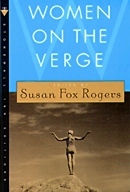|
|
||||||
| Excerpts: | ||||||
|
||||||
| A Word from the Editor |

![]()

 "The
Wind in My Mane"
"The
Wind in My Mane"
From Women on the Verge
By Franci McMahon
It was the end of summer in 1954 and I felt
reckless. Puberty nosed at my loins and I was beginning to be
curious that I had zero interest in dating boys. Give me a good
horse, any day.
Dust hung over the fairgrounds in this small town in eastern Washington, and I was killing time before the rodeo started. One day, I dreamed, I'd ride out of a bucking chute on a saddle bronc. Whenever I was lucky enough to have a horse of my own, or borrow a neighbor's, I'd practice all the trick riding moves. Most often at a standstill.
I wandered through the buildings looking at thin green beans, perfectly aligned in glass jars, at cupcakes preserved from my fingers behind hazy wax paper. Paper plates held flawless vegetables; three perfect carrots, three pods of peas. Aromatic hay bales boasted blue or red ribbons, and rabbits twiddled their noses as I walked by.
What I really wanted right then was the smell of a horse, warm in the sun. To place my ear against the round barrel and hear the sounds of rumbling gut and huge heart beating and the slow chewing of grass. I missed all that, for I was horseless.
My most recent horse had been sold a month before. With, most ominously, my saddle. And this would be my last rodeo for a long time. Next week my family would move to Washington, D.C., and I was sick at the thought of leaving sagebrush, open sky, and horses.
A shriek, then static came from the corner speaker. Jovially, a man's voice announced, a little too loudly, "Folks, we have the kids' race coming up at one o'clock. Turn out to cheer them... "
I half-listened, imagining sack races, three-legged tortures and other "fun" events for the kiddies. I'd tried those mortifying competitions at my grandparents' church picnics and had long ago vowed to ignore them.
"All you boys gets your ponies saddled and meet at the gate to the barns. You have to be under eighteen, but you don't have to own your pony... " Ha ha. "Beg or steal one, but join the fun!"
I actually felt my ears stand up, pointed, as my eyes riveted to the speaker mounted on the wall.
I grabbed the arm of the person standing next to me. "What time is it?"
She looked like my grandmother: gray hair, sturdy black lace-up shoes, and a print housedress. Her startled eyes were distorted and enlarged behind thick glasses.
"Please," I added.
The matron raised a heavy arm, bearing a tiny black watch, peered carefully, and said, "Twelve-ten, young lady."
Outside the 4-H Livestock barn, I stood a moment. I had to find a horse to enter in the race, for there was no question I'd ride in it. In the center of the racetrack was the parking area for trucks and horse trailers. I headed toward them.
The first trailer I came to had a sleek sorrel mare tied to it. A thin man polished her coat with a large white rag. The mare was every inch a racehorse.
"Mister, can I ride your horse in the kids' race?"
He turned his face toward me and, seeing his skepticism, I felt urged to continue.
"I've ridden all my life. My dad says I can ride anything on four legs."
But he wasn't interested in what my dad had to say. "It's a boys' race."
My parents had taught me not to argue with adults. They had also taught me the Jimmy Stewart school of right and wrong. "They didn't say girls can't--"
"Get along." He meant it.
This same scene was replayed at least five more times. Soon it would be one o'clock.
And then I spotted a small bay Quarter Horse. The kind of animal you know has a good idea what's at the end of each leg and where it's going. A horse that could work cows over rocky ground. And that had the smarts to handle the job. The horse's ears had me spotted, rotating radarlike as I approached.
A lanky, weathered man, the cuffs of his blue jeans turned up, wearing a straw Stetson, brushed burrs from the horse's tail. He took, saw me, straightened up, resting his elbow and forearm across the pony's round rump. He thumbed his hat back, to show a band of white skin, then damp, dark hair. His eyes crinkled with humor.
We looked at each other a moment. I filled my lungs with air as if I were about to dive into a deep pool. And before the words were out I knew he would say yes.
"He's a quick little horse," he said, "but he'll play you fair." He reached for the many-colored saddle blanket, swung the Western saddle to the horse's back, stepped to the far side to make sure everything hung straight, then did up the cinch. When the man offered the bridle's bit to the bay, the horse took it in his mouth, eagerly.
With a glance at his wristwatch, he handed me the reins and said, "Better get along."
My heels touched the bay's sides and instantly, he rolled into a powerful lope. He told me he had energy and speed to burn, yet he didn't lean on the bit or jerk the reins from my hands.
"Comin' through!" I yelled.
Someone opened the white-railed gate onto the track and we joined the electric current of boys and high-strung horses.
I was the only girl. I heard shouts about it being a boys' race, but I ignored them. I had a good horse beneath me, and they didn't know that evened the race. I trotted the bay away from the mess of rearing and flat-eared horses and felt his muscles loosen and warm. I admired his lightness and response to the touch of the rein on his neck, and felt his pace quicken as we turned to rejoin the excited riders and their mounts.
The loudspeaker drew us together, sorting out the tangled thicket into one ragged line. We slid into a position near the rail, and I was ready, low over the horse's neck, when the bell went off. I wanted us ahead of the pack. It was only a quarter-mile contest and there would be no question of saving energy for the final dash.
That little bay horse soared out in front. I crouched over the saddle horn, mane licking my face, a hand reaching along each side of his neck. My feet in the stirrups lifted me slightly out of the saddle, knees springing with each leap. Tremendous power surges propelled us along the white blur of the rail. Behind us hooves thundered, but we were the lightning slicing the air ahead.
Well in the lead, we made the turn. Ahead rose the grandstand filled with cheering people. I screamed like a banshee. The sounds from my mouth flew tattered like a banner out behind.
We were one, this horse and I. We were winners. Ahead I saw the white pole, and when we passed it I sat back and raised my triumphant arm and asked the horse to slow. Riders shot past me. Runaways. The little bay slowed to a lope and I was so proud of him, I let him prance for the admiring crowd.
"Why did you pull up? You could of won!" someone shouted from the rail.
"What?" I stopped the horse and turned to find who had spoken. The man called out to me again.
I looked down the track. The crowd cheered for a boy on a leggy gray horse. Everyone gathered round him. Baffled, I looked about. I was way out ahead and knew I'd won. Then I understood: Way down the far end of the grandstand another white pole rose above the left rail of the track.
I didn't know what to answer, so I turned to ride at a walk back to the start line, out the gate and toward the horse's temporary home. What would I say to the horse's owner? I'd let him down when he had enough faith in me to loan me his horse.
Yet I still glowed from the ride. Nothing had faded in my heart. The way the bay high-stepped told me he felt as I did. Smiling, I reached down and stroked the horse's wet neck.
I found the bay's owner striding toward me from the direction of the finish line. He had a huge grin on his face as he walked.
I jumped off. "I'm really sorry, mister. You've got a wonderful horse here and he should've won... "
"Far as I'm concerned, you rode a fine race."
He led the horse away, and I never saw either of them again.
And it was true; it was a fine race. We had the honor, if not the ribbon. And I had a taste of true power beneath me, flowing through.
FRANCI MCMAHON was born in Oregon from ranching and homesteading stock. Her first novel, Staying the Distance, was soon followed by works in the anthologies Tomboys!, Early Embraces, and Beginnings. A children's story by McMahon will appear soon in Cricket magazine. After years in the east, Franci now lives with her partner, Jenifer, and their horses and dog on the edge of Deerlodge National Forest in Montana.
Copyright ©
1999 Franci McMahon.
 Back
to the Stonewall Inn
Back
to the Stonewall Inn
